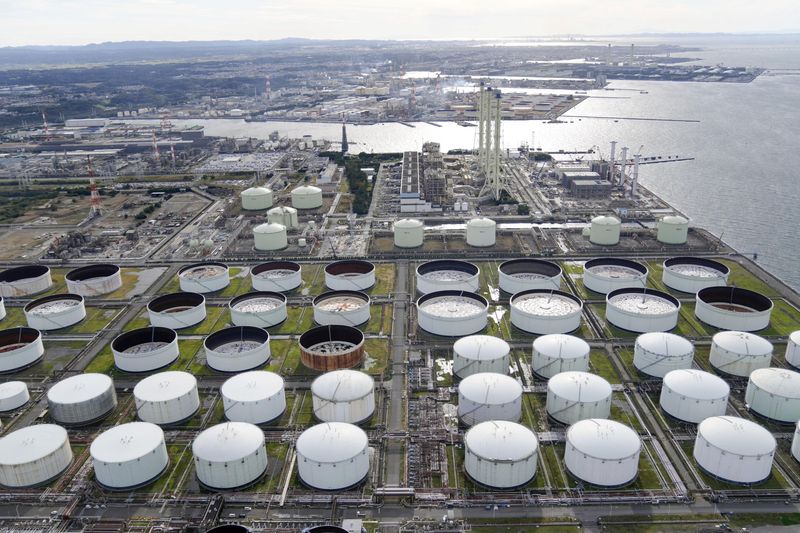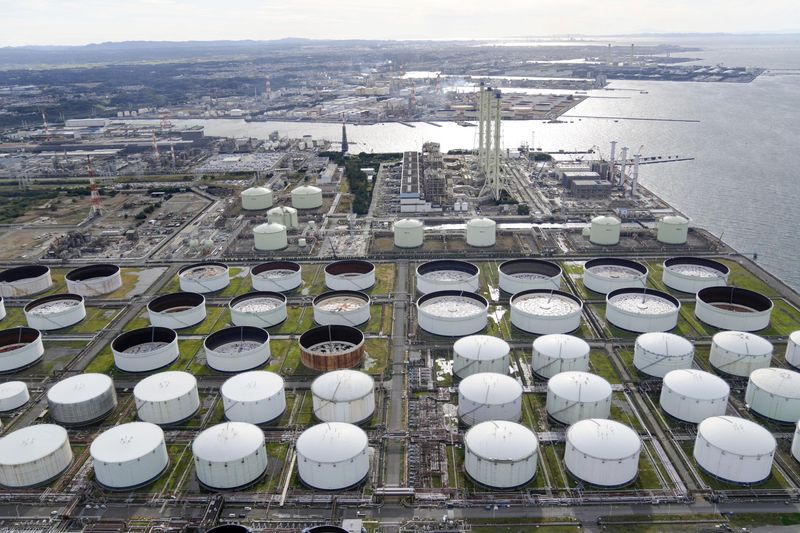Commodities
Tight supply, inflation concerns keep oil investors on fence


© Reuters. FILE PHOTO: An aerial view shows an oil factory of Idemitsu Kosan Co. in Ichihara, east of Tokyo, Japan November 12, 2021, in this photo taken by Kyodo. Picture taken on November 12, 2021. Mandatory credit Kyodo/via REUTERS/File Photo
By Natalie Grover
LONDON (Reuters) – Oil prices steadied on Thursday as investors weighed supply concerns against growing expectations that key Western economies will maintain high interest rates to tackle stubborn inflation.
By 1111 GMT, futures were down 37 cents to $96.18 a barrel after rising to their highest level since last November earlier in the session. The November contract expires on Friday.
The December Brent contract was down 35 cents at $94.01 a barrel.
U.S. West Texas Intermediate crude futures (WTI) were 24 cents lower at $93.44 a barrel, after rising above $95 earlier in the session for the first time since August 2022.
The spike in crude prices earlier in the session reflected scarce supply and inventory declines, analysts said.
But as Brent prices approach $100 a barrel, concerns are mounting that central bankers will be forced to persist with high interest rates to curb inflation fuelled in part by the high cost of energy.
“Investors know that higher oil prices are going to hurt the economy as economic activity will drop – not to mention the fear of (interest) rates staying higher for longer,” said Naeem Aslam of Zaye Capital Markets.
stocks fell by 2.2 million barrels last week to 416.3 million barrels, government data showed, far eclipsing the 320,000-barrel drop analysts expected in a Reuters poll.
Crude stocks at the Cushing, Oklahoma, storage hub that is the delivery point for U.S. crude futures fell by 943,000 barrels in the week to less than 22 million barrels, the lowest since July 2022, data showed.
Stockpiles at Cushing have been falling to near historic lows due to strong refining and export demand, prompting concerns about quality of the remaining oil at the hub and whether it will fall below minimum operating levels.
The crude draws follow combined voluntary cuts of 1.3 million barrels a day to the end of the year by Saudi Arabia and Russia, part of the group known as OPEC+ made up of the Organization of the Petroleum Exporting Countries (OPEC) and allies.
Russia’s ban on fuel exports will not be lifted soon and will remain in place until the domestic market stabilises, the state-run TASS news agency reported on Thursday, citing Russian Energy Minister Nikolai Shulginov.
Russia has not discussed with OPEC+ a possible crude oil supply increase to compensate for its fuel export ban, the Kremlin added on Thursday.
Commodities
Oil prices rise; U.S. crude inventories plunge, Russia-Ukraine truce eyed
Commodities
India’s Reliance to stop buying Venezuelan oil over US tariffs, sources say
Commodities
Oil prices climb on Venezuela supply worries

 Forex3 years ago
Forex3 years agoForex Today: the dollar is gaining strength amid gloomy sentiment at the start of the Fed’s week

 Forex3 years ago
Forex3 years agoUnbiased review of Pocket Option broker

 Forex3 years ago
Forex3 years agoDollar to pound sterling exchange rate today: Pound plummeted to its lowest since 1985

 Forex3 years ago
Forex3 years agoHow is the Australian dollar doing today?

 Cryptocurrency3 years ago
Cryptocurrency3 years agoWhat happened in the crypto market – current events today

 World3 years ago
World3 years agoWhy are modern video games an art form?

 Commodities3 years ago
Commodities3 years agoCopper continues to fall in price on expectations of lower demand in China

 Economy3 years ago
Economy3 years agoCrude oil tankers double in price due to EU anti-Russian sanctions























